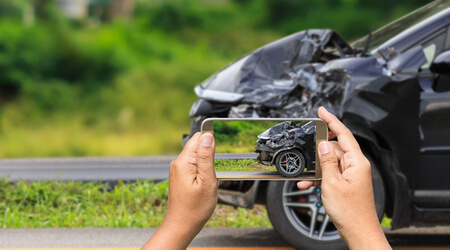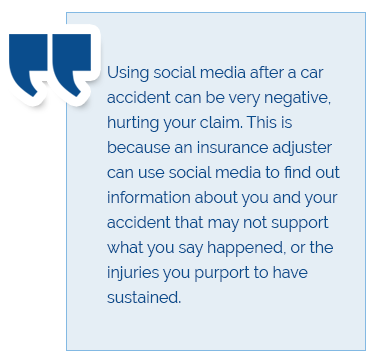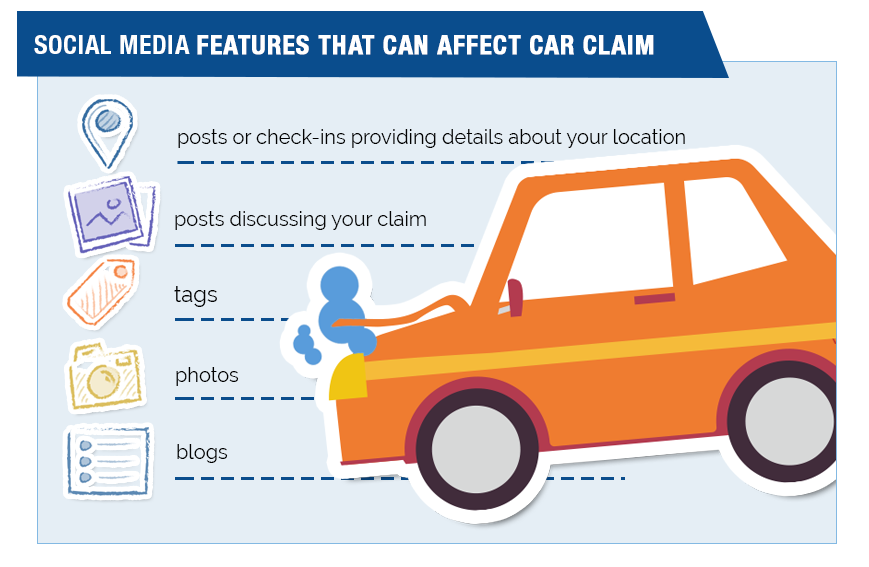
When you are involved in a car accident, it is natural to want to share the news with your friends and family. As you recover from the car accident, start to file your claim, and are offered a settlement amount, you will likely want to share this information with those in your life.
While telling friends and family that you were in a car accident is appropriate, posting about your car accident on social media may not be. While social media sites are a great way to keep in touch with others and exchange information, social media’s impact on your claim can be very negative. The following considers some social media dos and don’ts after an accident in South Carolina.
Why Social Media After a Car Accident Can Be Negative
 Using social media after a car accident can be very negative, hurting your claim. This is because an insurance adjuster can use social media to find out information about you and your accident that may not support what you say happened, or the injuries you purport to have sustained.
Using social media after a car accident can be very negative, hurting your claim. This is because an insurance adjuster can use social media to find out information about you and your accident that may not support what you say happened, or the injuries you purport to have sustained.
For example, a picture of you smiling and looking happy may suggest you are not suffering nearly as much as you claim to be. Or, a description of the accident on your social media page may provide a detail about the accident that could be construed in such a way that it could hurt your claim. In fact, even posting a location update from a place where you could be having fun or somewhere that wouldn’t make sense considering your injuries (like being at a golf course with a broken leg injury) could be misinterpreted and detrimental to your claim.
Best Practices for Social Media
After a car accident, the best thing you can do regarding your social media accounts is to suspend the accounts temporarily. If suspending your accounts is out of the question, do not use social media to talk about your accident in any way.
Here are some features of social media that could affect your car accident claim negatively:

Photos
A photo of you performing an activity — like riding a bike — that is not consistent with the injuries you have sustained could create doubt about whether your injuries are authentic. You should not post any photos after your car accident, even if the photos are from months or years before.
Tags
Even if you do not post your own photo, a friend may tag you in a photo or status update. Do not accept photo tags for the time being, and ask friends not to tag you at all.
Posts Discussing Your Claim
A post discussing your claim is perhaps the most detrimental thing you can do. Not only may you violate a confidentiality agreement (which is not uncommon when cases are settled), but you may also be providing an insurance adjuster with fuel that could later be used against you.
Posts Or Check-ins Providing Details About Your Location
A post or check-in providing details about your location may raise questions about the authenticity of your injuries. For example, if you suffered a head injury, why does your social media page show that you just checked in at a casino? Or, if you suffered lacerations and injuries to your legs, why does your social media page show that you are at the beach? Be careful about where you tell the public you are going.
Blogs
Posting to a blog after a serious accident may not be appropriate. For example, say that you are seeking damages for pain and suffering after your car accident. In your blog, you write about how you feel as though you are making emotional and physical progress, that things are looking up, and other positives in your life. Unfortunately, these statements can devalue your claim that you deserve compensation for pain and suffering, instead illustrating that you are faring just fine.
Do not accept friend requests from anybody you do not know, and set your social media profiles to private. The more caution you use with social media, the better.
Can an Insurance Adjuster Use Evidence on Social Media Against Me?
 Many people wonder whether an insurance adjuster is even legally allowed to use social media evidence against them, and some believe the use of social media evidence to be a privacy violation.
Many people wonder whether an insurance adjuster is even legally allowed to use social media evidence against them, and some believe the use of social media evidence to be a privacy violation.
According to the American Bar Association, however, social media evidence is subject to the same rules as other types of evidence, because social media platforms are public. The article published by the American Bar Association — Discovery and Preservation of Social Media Evidence — states that “the litigant has no reasonable expectation of privacy with respect to shared content.”
While an insurance adjuster would be in violation of the law if he or she hacked into your account and read private messages, anything posted on a public forum is fair game. You can bet that the insurance adjuster will search for anything that could potentially devalue your claim.
How a Car Accident Attorney Can Help
The social media dos and don’ts after an accident can be confusing, and you may feel overwhelmed or worried about social media’s impact on your claim. When you contact an experienced South Carolina car accident attorney, your lawyer can help you understand the best practices for social media, and can give you the thumbs up on content before you post it. A South Carolina car accident attorney can also collect and organize evidence to prove the damages you have suffered and negotiate for a fair settlement amount that addresses your losses.
At Joye Law Firm, our South Carolina car accident attorneys are ready to meet with you to discuss your car accident today. For a free case consultation, contact us online or call our offices now.







































